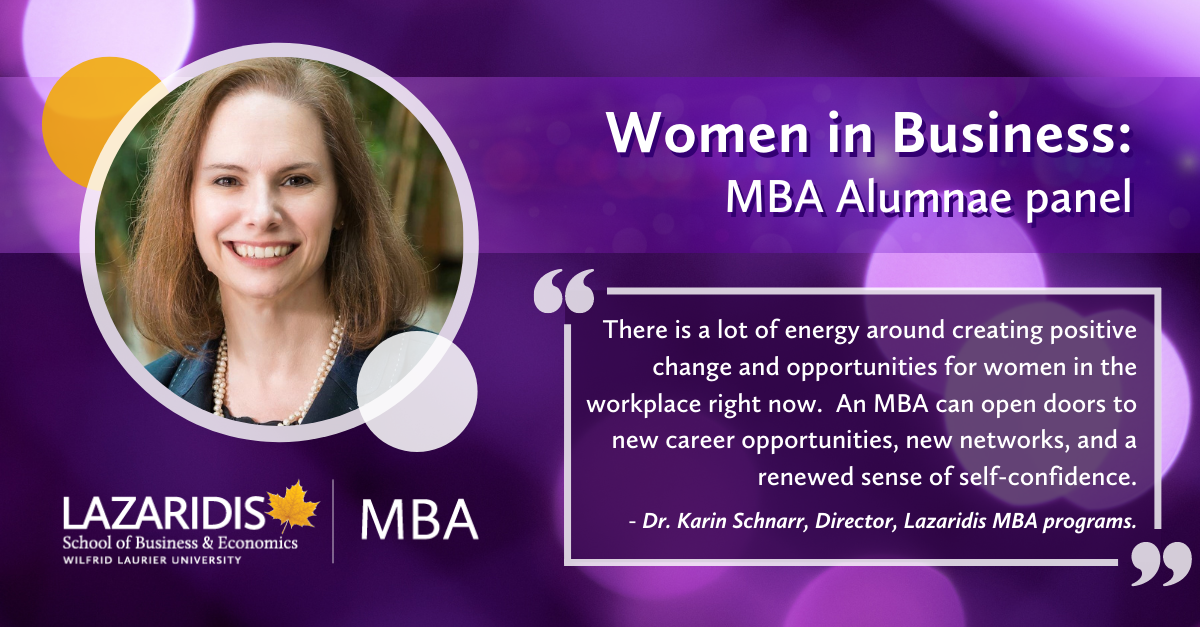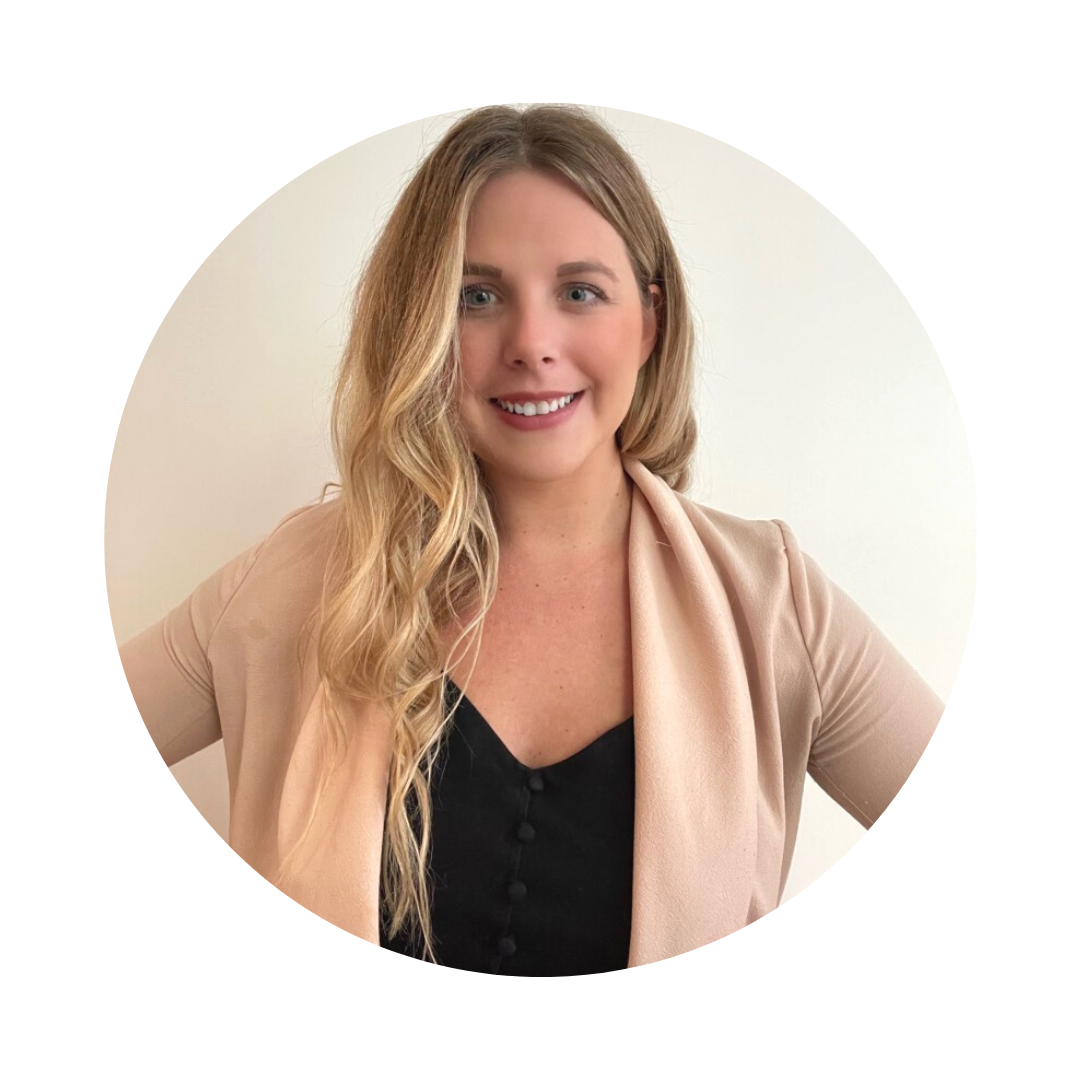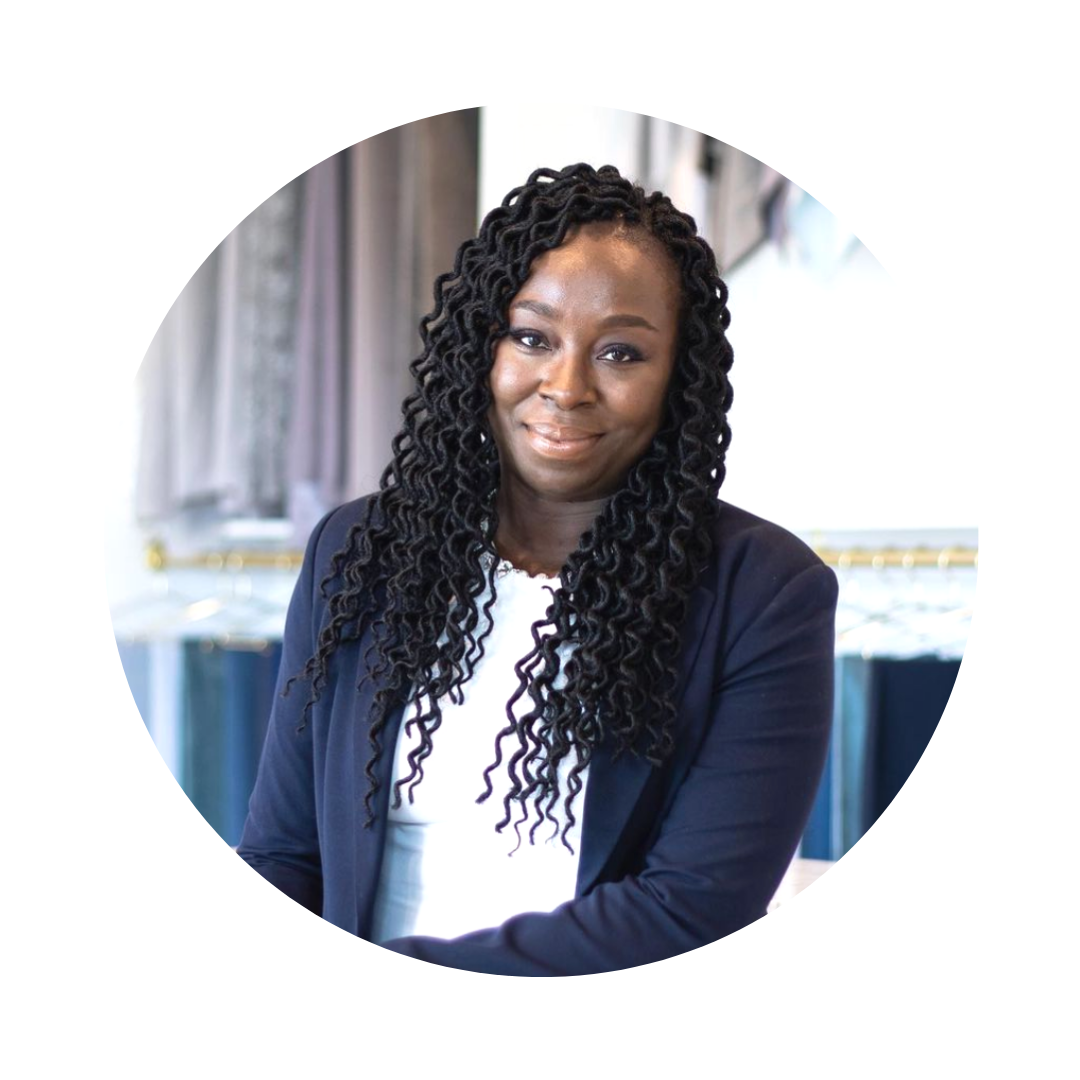We use cookies on this site to enhance your experience.
By selecting “Accept” and continuing to use this website, you consent to the use of cookies.
Search for academic programs, residence, tours and events and more.
March 4, 2022
Print | PDFThe Lazaridis School of Business and Economics recently hosted the annual Women in Business: MBA Alumnae Panel. Moderated by Associate Professor and Director of the Lazaridis MBA, Karin Schnarr, the evening was an opportunity to learn from our panelists about their motivations to pursue higher education, how they came to choose Wilfrid Laurier University, and how the Lazaridis MBA has helped to shape their careers.
Schnarr started the evening focusing on the continuing and evolving challenges women have experienced in the workplace, including those issues driven by the COVID-19 pandemic. Last summer, Schnarr was invited to chair the Government of Ontario's Task Force on Women in the Economy.
"There are some unique and different challenges that women face re-entering the workforce and I had an opportunity this summer to do consultations and provide advice to the government on that," Schnarr said.

Joining Schnarr for the panel discussion were:
 |
Rachel Ostrander, MBA’ 17 Manager, Global Infrastructure Advisory at KPMG LLP. |
 |
Anjie Persaud, MBA '18 Client Relationship Manager, Commercial Banking at Scotiabank and Part-Time Professor at Conestoga College |
 |
Chantelle Quow, MBA '20 |
Rachel: "I actually did my MBA fairly shortly after my undergrad, which was in chemistry at Dalhousie University. About midway through that degree I had this realization that I didn't want to be doing this for the rest of my life. Rather than redoing my undergrad and getting a business degree, I decided to do a double degree in chemistry and business and go from there. After graduating, I started applying for jobs, but found I wasn't getting a lot of traction. That's when I decided to do my MBA—and I'm very glad that I did. It really helped get me into the job market, gave me practical skills, and opened the doors for networking."
Chantelle: "When I started the MBA I had an undergraduate degree in Business Economics and I was working in the public sector at the municipal level. I wanted more for myself. I knew I wanted to be a business consultant, but felt I needed some experience my daytime job did not afford me. That's why I applied for the MBA. From the time I got into the program, I just felt like I finally met my people. These are my people. This is where I needed to be."
Anjie: "I graduated from the University of Waterloo arts program in sociology in 2017 and then started working at TD. I had three progressive roles in retail banking. I loved what I was doing and I had development plans for myself, but I had to pause and ask myself where I was going to go next. I was considering roles in management, wealth, or even leaving banking. I came to the decision to pursue a full-time MBA. It really allowed me to reinvest into myself and my career planning for future job opportunities. I knew it was also the right timing for me. As a young professional, I worried I wouldn’t do it if I started a family first, so that was part of the decision – it was a good investment in myself."
Anjie: “The classes are structured in a manner to helps you succeed. You’re assigned your core group with a diverse background. You lean on each other, you each bring different skill sets to it. There was one course where we used Excel heavily and I was connected to an on-campus tutor to do a boot camp in Excel. When you need support there are tons of resources on campus – it’s just about going out and taking advantage of them.
“I also want comment that, when I was considering the MBA, I didn’t really have other women where I was working that were doing an MBA, so there wasn’t anyone for me to ask about it. I think it’s important to be intentional about who you reach out to and get feedback and answers from.
“One of the things the MBA classroom environment really instilled in me was the ability to think and speak on your feet. It allowed the opportunity to grow and show that progressive growth. We had an event called Live ICE, for example, where we were assigned to work in a group to make a recommendation for a real business problem and present it to a panel for feedback. It's a safe and supportive environment where you're working together on this real project that's applicable to the world. It gives you something to then go out and speak to when you're in an interview to really emphasize what you took out of the MBA program."
Chantelle: "What I loved about the program is [that] we work as a team. So even though there may be members in that team who may not be strong in certain components, that’s where you can come in and shine and teach each other. And there may be things I’m not well versed in that they helped me with, so we really learned from each other.
“Many people who know me wouldn't expect this, but I used to have a fear of public speaking. In the MBA program, every class gives you an opportunity to present—whether you like it or not. But after doing that for three years, all of a sudden, I’m very comfortable with a mic, on stage, with people. It's a very safe learning environment. We all realize we're just humans and people make mistakes. Also, after majoring in strategic management, my ability to know the end goal and all the steps that are needed to get there is like—snap, I can see that as soon as you say it."
Rachel: "The profs teach the class from day one assuming that no one knows the information. They provide you with all of the basics, providing you with all of the learning materials from a background perspective and give you the tools to succeed.
“The fact that the in-class experience is group-based really helped, especially coming from a science undergrad where that wasn't the case. If I had to put a report out by a certain date, I was the only variable that went into whether that report was delivered or not. But that's not how the world works and [not] how your job is going to work. You can't do everything and you can't be the sole driver of all the work. You really have to trust your team—and a big part of that is communication. That was a key thing that I learned from the MBA that I just did not know before -- being reliant on my team and making sure the communication was there to trust each other. We had better solutions at the end of the day because everybody was coming from different perspectives."
Chantelle: “I’m a mom, a wife, and I had a job when I started my program. I was a graduate student trying to build my business on the side, so I had a lot going on and that’s part of the reason why I decided, at the end of my first year in the program, to leave my job. At that point it felt like a choice between my job and my entrepreneurial dream. The MBA gave me the confidence to take a leap and trust that my new skills would allow me to build a successful business.
“The other thing I did was ask for help. That was difficult for me because I thought I had to do everything on my own. I was a ‘solo-preneur’ so it couldn’t be perfect unless I was doing it. But what the program showed me was that you need a team – you can’t do it all by yourself, and I realized in life I needed a team to help me get to the finish line. So, I was calling in friends, calling my mom for babysitting, having meals prepared, and even asking for time to get some sleep. I relied on family and friends and the people around me for help and support. Don’t think you have to do it all alone – you do not.”
Rachel: “I certainly didn’t have as much going on as Chantelle, but I had a part-time job and was going into the co-op stream and had a similar kind of ‘ah-ha’ moment where I quit my job to focus on investing in myself and the degree.
“I also recognize that I can tend to get tunnel vision and get stuck on a task until it’s done, but sometimes I need to see that in myself and have enough self-awareness to take a step back and go to the gym or go visit my grandma and get my head out of the work. It can seem counter intuitive but actually sometimes you need to refresh your mind and take a step back to come back to it with fresh eyes.”
Anjie: “What appealed to me about my MBA was the full-time, one-year program, so I really thought out having the ability to be fully immersive for a full year. I structured it as if it were work – with a consistent schedule and routine. I was on campus for 8 a.m., class finished around 4 p.m., I would go to the study rooms and leave around 6:30 p.m. That consistent schedule really worked for me.”
Rachel: "One of the big reasons was the co-op opportunity. I really wanted the practical experience and the opportunity to earn some money while I was doing the degree. When I was looking, there were only two programs in Canada that offered a Co-op MBA program and Laurier was one of them. The other school only gave one co-op term but I really wanted the two terms to get my foot in the door at a couple different companies to test out different jobs, see what I like and what was the best fit. My first co-op term was with a sustainability consulting firm in Johannesburg, South Africa and my second was at KPMG, where I currently still work. [KT2] The 100% placement thing was a big deal for me too. I wasn’t looking for the letters at the end of my name, it was all about the practicality of the degree, the ROI, and the experience.
“The second was cost. That was one of the drivers for actually getting my MBA – the value for money. What I see now as an employer is that no one looks at how much you paid for your MBA or where you got it done. It’s about who’s the best communicator in the interview, because quite frankly, your resumes are prescreened so everyone who interviews has the technical skills required and then it’s all about communication.”
Anjie: "I would have to echo many of the same sentiments as Rachel about location, cost, the program, etc. Now that I’m done the program and looking back, something that I found so invaluable was the faculty. I have great relationships with several of them. It's also a network that you're building and the support is there even beyond the program from both profs who have helped me review multiple job offers to my peers who still talk and support one another personally and professionally."
Chantelle: "For me, it was the cost and the location. I was in Toronto, so I wanted to be closer to home, especially for my son. The program's alternate-weekend schedule meant I could build my business and still gain new skills and learnings. Lastly, the reputation. I went to the Women in Business panel when I was trying to make my decision and I went to events put on by other schools. Everybody who I spoke to said great things about Laurier — the people, the professors, and the support and that's not something I was hearing at the other schools. They were more of a competitive environment and I was looking for more of a collaborative environment. And like Anjie said, with your classmates and your professors, they were there to help me with my business. They were there to answer my questions. My teammates today still send people my way. The reputation of Laurier sealed the deal."
Rachel: “I think one of the things that surprised me most was the level of confidence I built throughout the program. Whenever you go through some sort of change in your life there’s always a bit of fear and uncertainty and risk that you’re taking, especially when you’re putting a lot of money down to secure that. I was scared and nervous and throughout the MBA I really grew a lot of confidence in myself and my own capabilities and at the end of the day, that’s been a key driver of my success going forward and wasn’t something that I expected from my degree.
“I also have to say the relationships and friends. The relationships we built are so valuable because, I’ll be in a meeting and look at who’s on the other side of the table and it is someone I know closely from the MBA program. It’s still surprising when [I see] people I did my MBA with sitting at the other side of the table in negotiations or contract signings at my job; I love it.
Chantelle: “My biggest surprise was actually my specialization. I came in with an economics undergrad and really thought I was going to either specialize in finance or accounting but ended up specializing in strategy. That’s one thing they recommend when you start is to stay open, take courses, figure out what you like, because where you’re coming from is not necessarily where you’re going to end up and those were the truest words.”
Anjie: “I was surprised by how much the company we did the consulting project for really loved and appreciated the business plan we implemented. That project was so satisfying and fulfilling. And the other part I didn’t expect Is the amount of personal growth that came from the program. I was one of those people who really did want the letters, and knew the value of them in my industry, but it became more personal and as I look back now, I’m really thankful for that.”
Anjie: “Going through the MBA, and even now, do I have moments of self-doubt in my abilities? I certainly did in the sense of questioning: ‘Can I be successful? Am I contributing enough to my group’ I think where I was able to deal with that within the program was in the feedback sessions where I was able to hear the reflection on my ideas and recognize that I was part of the success of the strategy and see how we built it together. It helped me reaffirm that I do have things to bring to the table.”
Rachel: “One hundred per cent and on so many different occasions. I felt that [way] getting into the MBA, I felt that [way] when I got my job offer, I’ve felt that [way] through the course of my career and now as someone in a management position. I feel it when I go into boardrooms and I’m the only woman in the room and I’m the youngest person in the room. It still comes up and I think it’s really normal to feel that way. I think the best thing you can do is put yourself out of your comfort zone and see what you’re capable of – I assure you, you’re capable of a lot. The more times you put yourself out of your comfort zone and you speak up and raise your voice, it builds that confidence and the impostor syndrome voice gets smaller and smaller. And I still get it, but it only pops up every once in a while now.”
Chantelle: “One hundred per cent I felt impostor syndrome, especially being an entrepreneur. You start thinking ‘Okay, I want to be a business consultant; why would anybody listen to me?’ After going through the program and the learnings and the support, you get the confidence to go out there, and realize ‘I got this far, I’m obviously intelligent, I do have things to offer.’ I think even though you feel that fear and the impostor syndrome, the whole thing is to just keep moving forward. Everything you’re looking for is on the other side of fear, so feel it, understand what it is, and just keep going forward and you’ll surprise yourself. Now, I can hear it, recognize it, tell it I’m great and keep moving forward.
Karin: “You are all amazing, and don’t even think about imposter syndrome. You are here (or reading this) and interested in investing in yourself and bettering yourself. You deserve to be where you are, you deserve that promotion, you deserve to do well in your career. Don’t even give it a second thought. You are all amazing people with unbelievable capabilities – the MBA is only going to help you augment them so you can do even more than you think is possible for you to do. One of the best things about my job is getting to watch my students grow and gain that confidence and trust in themselves and watch them blossom and become amazing representations of what was already inside them.
Chantelle: “You’re already getting the information – take the leap. Invest in yourself. You have so much magic within you, you’ve just got to take the next step. You’ll surprise yourself at the amazing things you can do once you’ve completed this program. I surprise myself even today at the projects I get to work on and the lives I get to change. And especially if you’re a woman of colour, we need to see more women of colour with MBA degrees and in business and we need to help our community. So, if you’re a woman of colour, I encourage you to please get into this program, get your MBA. Let’s show them what we can do.”
Rachel: “Definitely invest in yourself, but also, if you need help, ask for help. Rely on the people around you and don’t feel like it’s a weakness to ask for help. Build yourself and surround yourself with a great support system and believe in yourself. If you need help, raise your hand, there are lots of people out there willing to help if you ask. I think it’s a sign of strength and it will only help you grow.”
Anjie: “I would say it’s been an incredible year, with so much happening around the world. Something has brought you here, whether you’re at the very beginning or you’re midway through exploring, be intentional. Reach out to get the information you need and own your decision. I really encourage you to take the jump – there’s lots to be learned.
The Lazaridis Masters of Business Administration (MBA) program offers programming in Waterloo and downtown Toronto in a variety of formats, including full-time, part-time, and co-op. Our alumni information panels and virtual information nights run several times every term and anyone is welcome to attend. To learn about all of our sessions, visit our events page.